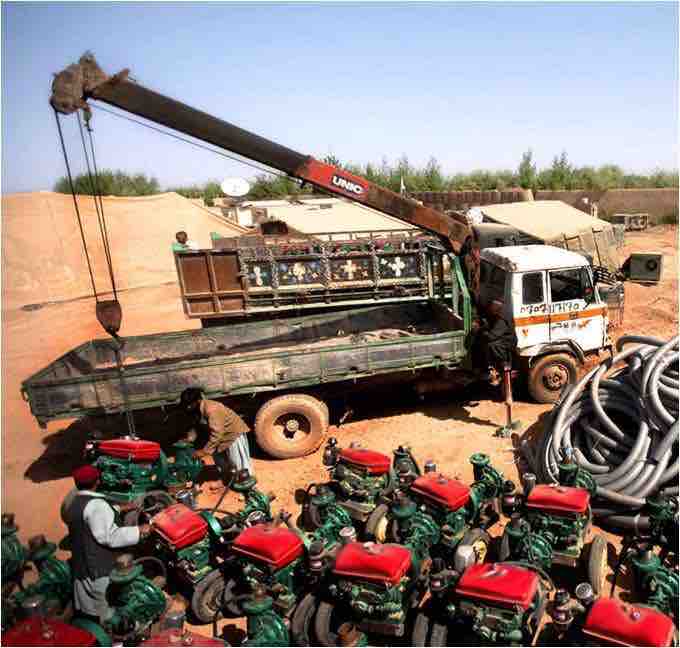Economic Aid and Sanctions
As part of foreign policy, states can use money and monetary policies to either help or penalize other states. Economic aid is a voluntary transfer of resources from one country to another, given at least partly with the objective of benefiting the recipient country . Sanctions, on the other hand, are penalties (usually in the form of trade policies) that are applied to one country by another.

Development Aid
States can give economic aid to help another country's economic development. In this picture, the US government has supplied water pumps to a village in Afghanistan.
Economic Aid
Aid may have other functions besides humanitarian: it may be given to signal diplomatic approval, strengthen a military ally, reward a government for behavior desired by the donor, extend the donor's cultural influence, provide infrastructure needed by the donor for resource extraction from the recipient country, or gain other kinds of commercial access. The threat of withdrawing aid can be another means by which a state can pursue its national interest. Humanitarianism and altruism are, nevertheless, significant motivations for the giving of aid.
A major proportion of aid from donor nations is based on conditionality, meaning that the aid comes with conditions. For example, some donors mandate that a receiving nation must spend the aid on products and expertise originating only from the donor country. Similarly, the World Bank and the International Monetary Fund, as primary holders of developing countries' debt, attach structural adjustment conditionalities to loans which generally include eliminating state subsidies and the privatizing state services.
Criticisms of Economic Aid
Aid is seldom given from motives of pure altruism; instead, it is often used as a tool of foreign policy. It may be given as a means of supporting an ally in international politics. It may also be given with the intention of influencing the political process in the receiving nation. Aid to underdeveloped countries is often more in the interest of the donor than the recipient, or even a form of neocolonialism. In recent decades, aid by organizations such as the International Monetary Fund and the World Bank has been criticized as being primarily a tool used to open new areas up to global capitalists, and being only secondarily, if at all, concerned with the well-being of the people in the recipient countries.
Economic aid is often criticized for simply not being effective: it does not do what it was intended to do or help the people it was intended to help. Statistical studies have produced widely differing assessments of the correlation between aid and economic growth, and no firm consensus has emerged to suggest that foreign aid boosts growth. It has also been argued that foreign aid harms recipient governments, often because aid distributed by local politicians finances the creation of corrupt government.
Economic Sanctions: Resolving Trade Disputes
Economic sanctions are domestic penalties applied by one country or group of countries on another for a variety of reasons. Economic sanctions include, but are not limited to, tariffs, trade barriers, import duties, and import or export quotas.
Sanctions can arise from an unresolved trade or policy dispute, such as a disagreement about the fairness of a policy affecting international trade. For instance, one country may conclude that another is unfairly subsidizing exports of one or more products, or unfairly protecting some sector from competition from imported goods or services. The first country may retaliate by imposing import duties on goods or services from the second.
For example, in March 2010, Brazil introduced new sanctions against the US. These sanctions were on the basis that the US government was paying cotton farmers for their products, an action not allowed by the WTO. The WTO is currently supervising talks between the states to remove the sanctions.
Economic Sanctions: Achieving Policy Goals
Economic sanctions also can be a coercive foreign policy measure used to achieve particular policy goals related to trade, governance, or humanitarian violations. For example, the United States has imposed economic sanctions against Iran for years on the basis that the Iranian government sponsors groups who work against US interests . The United Nations imposed stringent economic sanctions on Iraq after the first Gulf War, partly as an attempt to make the Iraqi government cooperate with the UN weapons inspectors' monitoring of Iraq's weapons programs.

Iran and Sanctions
The US has long upheld economic sanctions against Iran, arguing that Iran pursues policies that are contrary to US national interest.